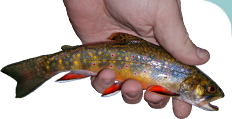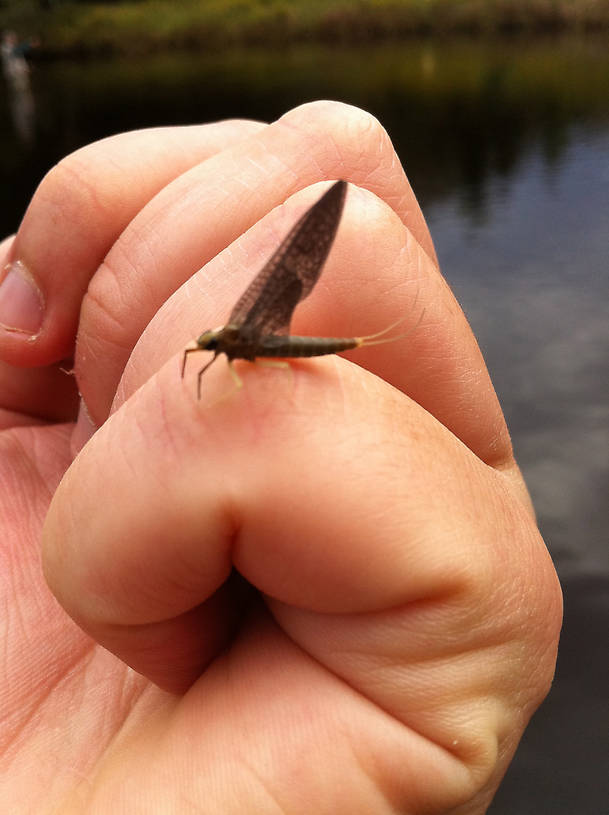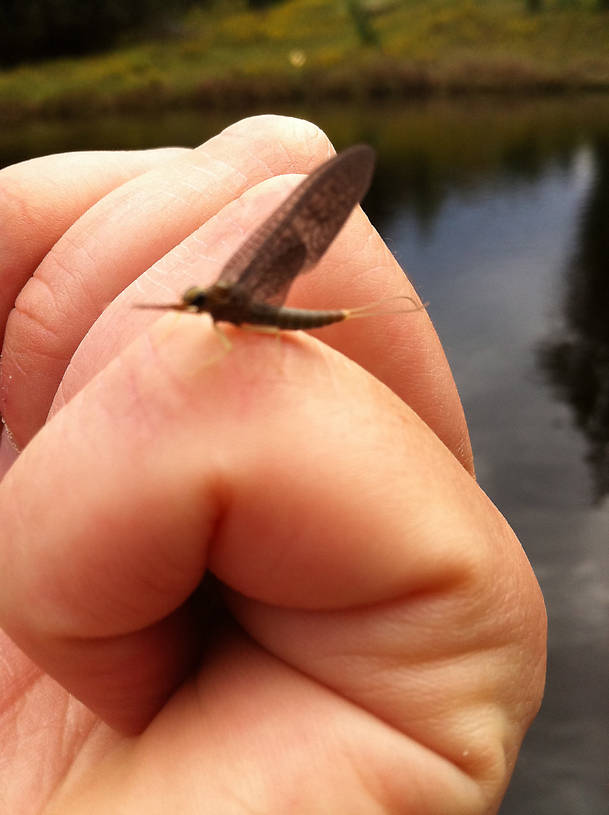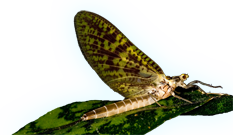Blog & Latest Updates
Fly Fishing Articles
Insects by Common Name


> > old pic, new to the game


| Mahones41 | December 3rd, 2011, 2:37 pm | |
| Posts: 11 | hey all, i've been fly fishing for a few years now and trying to get a better idea of whats actually going on under the water and in the air.. i took this pic on september 17th 2011 in the Pocono Mountains in PA probably later afternoon.. at first i thought it was a green or grey drake but it looks similar to the PMD on the home page.. any info, such as size, would really be appreciated. thanks sorry about the blurriness.. | |
| Entoman | December 3rd, 2011, 3:49 pm | |
| Northern CA & ID Posts: 2604 | Hi M41, Welcome to the forum! What you have there is an Isonychia female dun, most likely I. bicolor. The common name is Leadwing Coachman (among others). What easily sets it apart from other mayflies is the combination of pale hind and middle legs with the dark forelegs you can see held extended together. The large hind-wings are also a reliable indicator. Two tails, color, and size are helpful as well, but they are less reliable characters as they can vary and a tail can always be knocked off, messing up the count. The small eyes and lack of claspers indicate female. | |
| "It's not that I find fishing so important, it's just that I find all other endeavors of Man equally unimportant... And not nearly as much fun!" Robert Traver, Anatomy of a Fisherman | ||
| Taxon | December 3rd, 2011, 4:21 pm | |
Site Editor Royse City, TXPosts: 1350 | Mahones41- Well, you got the Drake part right. It's a female dun (subimago) of genus Isonychia, which has the common name, Slate Drake. Edit: Oops Kurt, didn't see your post. | |
| Best regards, Roger Rohrbeck www.FlyfishingEntomology.com | ||
| Entoman | December 3rd, 2011, 4:33 pm | |
| Northern CA & ID Posts: 2604 | Not the first or last time we'll do that to each other.:) | |
| "It's not that I find fishing so important, it's just that I find all other endeavors of Man equally unimportant... And not nearly as much fun!" Robert Traver, Anatomy of a Fisherman | ||
| Mahones41 | December 3rd, 2011, 7:40 pm | |
| Posts: 11 | thanks for the help guys. i thought i may have been a slate drake just because thats one of the estimated hatch date charts showed. but why did it have more of a green color? i picture slate as grey.. or i guess that is the difficult part with the common name and the latin? also what fly size would you guess that it would be? and why if the common name is 'slate drake' do the flies i buy to imitate the slate drake have a dark reddish body? or is this why i should stop talking about learning to tie flies and actually do it? | |
| Troutnut | December 3rd, 2011, 10:09 pm | |
Administrator Bellevue, WAPosts: 2737 | I think the "slate" refers to the color of the wings. Another common name is "mahogany dun," which refers to the body color. Check out my Isonychia page to see some of the variation in colors. I usually fish Isonychia imitations in size 10, but it can vary depending on the particular stream and species. | |
| Jason Neuswanger, Ph.D. Troutnut and salmonid ecologist | ||
| Entoman | December 3rd, 2011, 10:13 pm | |
| Northern CA & ID Posts: 2604 | Slate is referring to the color of the wings which look to be dark gray to me. The only color I see that could be construed I guess as a very pale olive are the light areas (tails, legs, areas around the head, eyes). Perhaps they are, as some have been described that way to the naked eye. Another possibility is its body and wings are so dark that the close proximity can be fooling your eyes a little. Hold pale yellow or cream against black and they will take on an olivaceous tone (mixing black and yellow seal fur makes excellent olive dubbing). The body color of your specimen looks to be the commonly described dark eggplant. As to size, aren't those your fingers? Hold them up in the same position and apply a ruler while looking at the photo. The genera is documented over a pretty wide scale so that won't be much help to you, but I would estimate around 12 - 14 mm. Edit: Ah... Sorry Jason. See Roger? :) | |
| "It's not that I find fishing so important, it's just that I find all other endeavors of Man equally unimportant... And not nearly as much fun!" Robert Traver, Anatomy of a Fisherman | ||
| Taxon | December 3rd, 2011, 10:23 pm | |
Site Editor Royse City, TXPosts: 1350 | Mahones41-but why did it have more of a green color? As Jason indicates, slate refers to the wing color. Having said that however, both the wing color and the body color of Isonychia can be highly variable, even for a given species, lifestage (dun or spinner), and sex. | |
| Best regards, Roger Rohrbeck www.FlyfishingEntomology.com | ||
Quick Reply
You have to be logged in to post on the forum. It's this easy:
Related Discussions
| Title | Replies | Last Reply |
| Re: New Mexico ??? In Beginner Help by Hankaye | 3 | Apr 19, 2013 by Sayfu |
| Re: Help with Mayfly identification In the Identify This! Board by MItroutbum | 5 | Jun 14, 2008 by Wiflyfisher |
| Re: Coffin Fly Spinner In Male Ephemera simulans Mayfly Spinner by Jackson | 6 | Jun 10, 2009 by Martinlf |
| Re: Light Cahills? In the Identify This! Board by Adirman | 3 | Jun 23, 2016 by PagansMind |
| Re: Fall Flies (5 more) In the Photography Board by Softhackle | 16 | Oct 6, 2007 by Shawnny3 |
| Re: What mayfly is this In the Identify This! Board by CouxJoe | 9 | May 17, 2007 by Quillgordon |
| Acroneuria specimen moved from genus to species level In Acroneuria carolinensis Stonefly Nymph by Entoman | 0 | |
| Re: Identification of a possible Cordulegaster Dragonfly Nymph In Cordulegaster Dragonfly Nymph by IanB | 6 | Feb 10, 2017 by Taxon |
| Re: collected from Bitterroot yesterday Drake In the Identify This! Board by Leskorcala | 4 | Jun 17, 2020 by Leskorcala |
| Re: stages before emergence In the Insect Order Ephemeroptera by Troutnabout | 7 | Sep 18, 2006 by Troutnut |
Troutnut.com is copyright © 2004-2024 Jason
Neuswanger (email Jason). See my FAQ for information about use of my images.
 privacy policy
privacy policy




